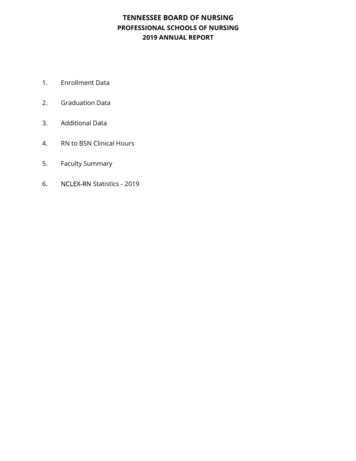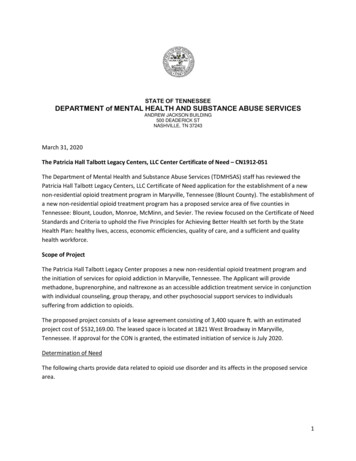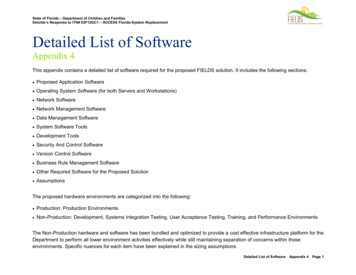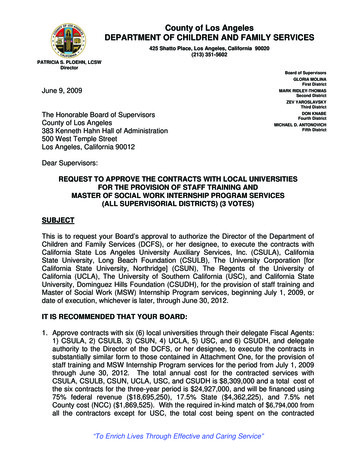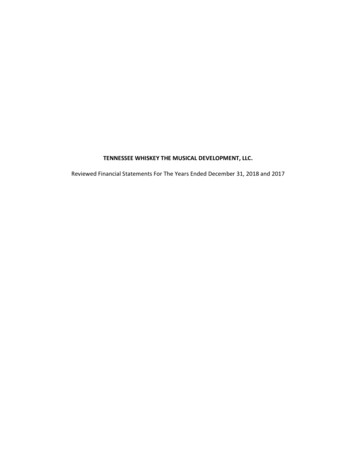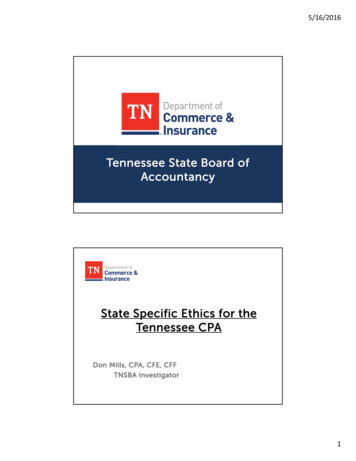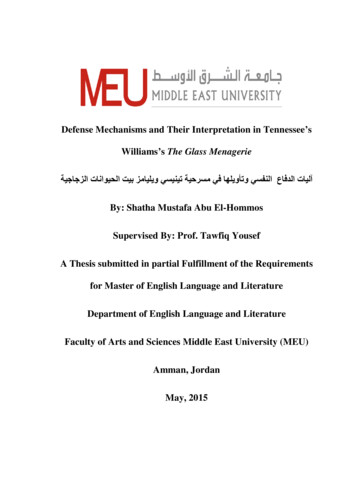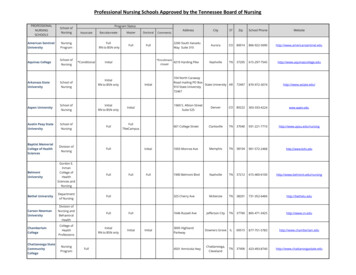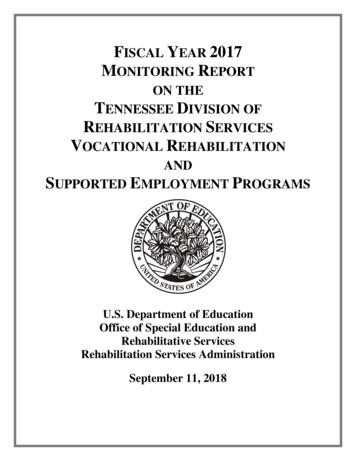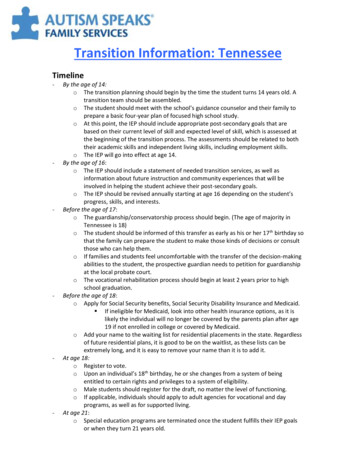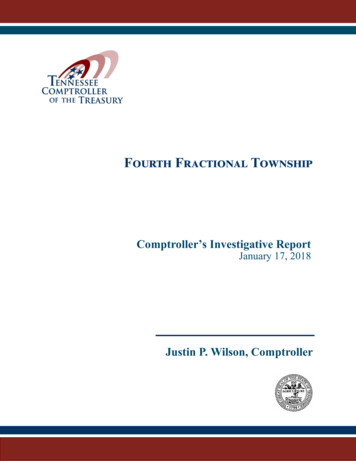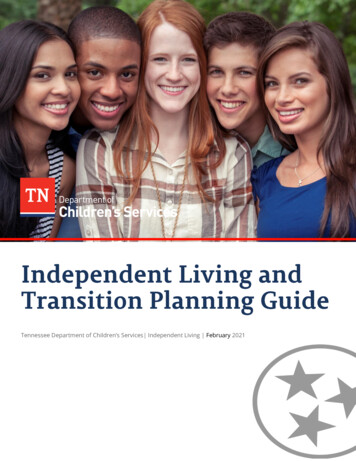
Transcription
Tennessee Department of Children’s Services Independent Living February 2021
The Independent Living and Transition Planning Guide is a set of protocols. These protocols are designedto inform the following: The process of developing Independent Living and Transition Plans, with particular attention paid tothe roles and responsibilities of the participants and documentation in TFACTS Procedures for establishing Extension of Foster Care Services and information about Extension ofFoster Care file maintenance Assisting youth and young adults with maintenance of health insurance.
Development of the Independent Living Plan (ILP) .1Development of a Transition Plan: Procedure to Promote a Successful Transition of Youth fromState Custody to Adulthood and Independence .2Essential Documents List: Transition From Care 5The Transition Plan for Young Adults Receiving Extension of Foster Care Services .6Procedures for Extension or Re-Establishment of Foster Care For Young Adults .7Guidelines for Terminating Extension or Re-Establishment of Foster Care for Young Adults 9Extension of Foster Care Services Case File . .11Guide of Responsibilities .13Child and Family Team Meeting Guide 15Health Insurance for Youth Aging Out of Foster Care .16Independent Living Forms .16
As a component of the Family Permanency Plan, the Independent Living Plan (ILP) must be developed in thecontext of a Child and Family Team Meeting (CFTM: reference the DCS Child and Family Team Meeting Guide)as required by DCS Policy 16.51,Independent Living and Transition Planning.The ILP is unique in that a specific emphasis must be placed on the youth’s input and preferences in itsdevelopment. Its purpose is to guide the acquisition of skills youth will need to be successful as adults. Theintegration of outcomes that anticipate the youth’s increasing ability to manage all aspects of their own livesself-sufficiently, with all available options for the establishment of legal, physical, and relational permanencyand support, is essential. This work must be viewed in the context of a life-long process.As part of the preparation of team members for the CFTM, the assigned FSW must:1. Ensure that all youth in state custody age fourteen (14) or older complete the necessary life skillsassessment, at least annually. This must occur in advance of plan development, as the results andrecommendations generated from the assessment must guide the creation of measurable outcomes inthe ILP. The initial life skills assessment must be completed no later than fourteen (14) days after a youthenters custody. The time frames for updating the assessment are referenced in the Identifying andAccessing Independent Living Services Manual.2. Whenever possible and appropriate, ensure that the youth’s caregivers or supportive adults completethe necessary life skills assessment. This must occur in advance of plan development, as the results andrecommendations generated from the assessments must guide the creation of measurable outcomesgoals in the ILP.Note: There are circumstances that may impede the completion of a life skills assessment in advance of theinitial CFTM/ Family Permanency Plan development. These circumstances and alternative measures areoutlined in the following protocol: Alternative Life Skills Assessment Protocol, (Refer to the Identifying andAccessing Independent Living Services Manual, page 4).3. Communicate to the youth and team members that foster parents or providers will assist in the healthydevelopment of youth in care through implementing “reasonable and prudent parent“ decision makingthat supports health, safety and best interest of the youth. These decisions can include opportunities forrisk-taking like those typically made by parents of youth who are not in foster care. That planning willpromote “normalcy” and the ability to engage in healthy developmental appropriate activities thatpromote well-being for all youth in care.4. Communicate to the youth and team members that foster parents or providers will also assist the youthin making developmentally appropriate choices in choosing normal activities which include, but are notlimited to extracurricular, enrichment, and social activities, that may include dating, outdoor activities,1
“hanging out” with friends, prom, sports, clubs, vocational activities, religious/cultural events, field trips,driver’s education, etc.5. Ensure that all team members expected to participate or provide technical assistance/specializedadvisement are given adequate information to review. Team members may include, but are not limitedto:a) Important adult connections (parents, etc.);b) Foster Parent(s);c) DCS Education Specialists;d) DCS Independent Living Specialists;e) DCS Psychologists;f) DCS Nursing staff;g) DCS Health Advocacy Staff, including the adult transition team;h) Center of Excellence (COE) clinicians;i) Provider agency staff;j) Representatives of the community mental health agencies;k) Department of Intellectual and Developmental Disabilities (DIDDS), andl) Office of Vocational Rehabilitation.Youth must also be informed of the option to invite up to two (2) individuals or are not direct caregivers orfamily members, such as coaches or mentors, to assist with development of the plan. One of these additionalparticipants may be designated as an advisor/advocate.6. The information referenced may include, but is not limited to, medical evaluations, clinical and educationalevaluations and assessments, and vocational assessments, but must include the Life Skills Assessment results(Refer to the Identifying and Accessing Independent Living Services Manual). This must occur in advance ofplan development, as team members will need sufficient time to review the information, identify resourceoptions, and formulate recommendations.Use the Permanency Plan Development Guide to ensure that the Independent Living Plan is developedappropriately.As a component of the Family Permanency Plan, the Transition Plan must be developed in the context of aChild and Family Team Meeting (CFTM: reference the DCS Child and Family Team Meeting Guide) and asrequired by DCS Policy 16.51 Independent Living and Transition Planning.2
The Transition Plan is unique in that a specific emphasis must be placed on the youth’s input and preferencesin its development. Its purpose is to identify methods and resources to help youth make a successfultransition from care to adulthood, when developed for youth in custody age 17 and up.1. An Independent Living (IL) Specialist, or other representative of the Office of Independent Living, mustmeet with designated regional DCS staff on a monthly basis to identify young adults ages seventeen (17)or older who are at risk of emancipating to adulthood from state custody. Mutual decisions must bereached regarding the extent to which staff from the DCS Office of Independent Living must providetechnical assistance (e.g., information and advisement) as part of Child and Family Team Meeting (CFTM)preparation, or to directly participate in the scheduled CFTMs.2. DCS Office of Independent Living staff will share information obtained from TFACTS reports to helpidentify these youth with applicable Regional Administrators, Juvenile Justice Leadership, TeamCoordinators (TC), Team Leaders (TL) and Family Service Workers (FSW) on a monthly basis.3. The TL and FSW must ensure that a “Transition to Adulthood” CFTM (as defined by the DCS Child andFamily Team Meeting Guide) is convened for all custodial youth who reach 17 years of age, and then atleast six (6) months prior to anticipated discharge if the young adult is adjudicated delinquent andanticipated to remain in DCS custody past eighteen(18) years of age. The purpose of the CFTM is to develop a Transition Plan. When there is a designatedFSW available in the region who works with young adults receiving Extension of FosterCare Services, the CFTM must consider the appropriateness of transferring a young adult’s case upondischarge.4. Ensure that all team members expected to participate or provide technical assistance/specializedadvisement are given adequate information to review. Team members may include, but are not limitedto:a) Important adult connections (parents, etc.)b) Foster Parent (s)c) DCS Education Specialists;d) DCS Independent Living Specialists;e) DCS Psychologists;f) DCS Health Services staff, Center of Excellence (COE) clinicians;g) Provider agency staff;h) Representatives of the community mental health agencies;i) Department of Intellectual and Developmental Disabilities (DIDDS), andj) Office of Vocational Rehabilitation.Youth must also be informed of the option to invite up to two (2) individuals who are not direct caregivers orfamily members, such as coaches or mentors, to assist with development of the plan. One of these additionalparticipants may be designated as an advisor/advocate. Additionally, the FSW will:5. Communicate to the youth and team members that foster parents or providers will assist in the healthydevelopment of youth in care through implementing “reasonable and prudent parent“ decision makingthat supports health, safety and best interest of the youth. These decisions can include opportunities forrisk-taking like those typically made by parents of youth who are not in foster care. That planning willpromote “normalcy” and the ability to engage in healthy developmental appropriate activities thatpromote well-being for all youth in care.6. Communicate to the youth and team members that foster parents or providers will also assist the youthin making developmentally appropriate choices in choosing normal activities which include, but are notlimited to extracurricular, enrichment, and social activities, that may include dating, outdoor activities,“hanging out” with friends, prom, sports, clubs, vocational activities, religious/cultural events, field trips,driver’s education, etc.3
7. Important information for developing Transition Plans may include, but is not limited to, medicalevaluations, clinical and educational evaluations and assessments, and vocational assessments, but mustinclude the Life Skills Assessment results. (Refer to the Identifying and Accessing Independent LivingServices Manual). This must occur in advance of plan development, as team members will need sufficienttime to review the information, identify resource options and formulate recommendations.8. The FSW will develop a Transition Plan concurrently with the initial Family Permanency Plan for all youthwho enter DCS custody at or after age 17. All other procedures associated with this process must befollowed.9. It is not necessary that an IL Program Specialist attend every CFTM focused on Transition Planning, butthe IL Program Specialist must be in attendance when circumstances exist that require additionalsupport as outlined in item 1 of this protocol. The applicable regional or Juvenile Justice and IL Programstaff must make this decision jointly. If it is determined that an IL Program Specialist should attend aCFTM, the FSW must provide notice of the CFTM to the Office of Independent Living at least ten (10) daysin advance utilizing form CS-0746, Meeting Notification.10. The FSW must develop a Transition Plan in the context of the CFTM. The Transition Plan must include thepossibility and benefits of receiving Extension of Foster Care Services, as applicable, to includeTransitional Living Services if necessary or appropriate. It is not necessary to update the other portionsof the Family Permanency Plan unless it is otherwise due or warranted.11. The Transition Plan must be reviewed by the Court within ninety (90) days prior to the youth exiting statecustody.12. The FSW must then ensure that a Discharge Planning CFTM as outlined in the DCS Child and FamilyTeam Meeting Guide is convened within thirty (30) calendar days of the young adult exiting statecustody. The youth and Child and Family Team must review the Transition Plan, and the FSW mustensure that all outcomes are updated as needed to reflect the young adult’s current needs anddecisions. When there is a designated unit or designated FSW available in the region in which a youngadult may receive DCS Extension of Foster Care Services, a representative of this unit must attend thedischarge staffing if the young adult is accepting DCS Extension of Foster Care Services. If it isdetermined that an IL Program Specialist and/or designated staff member should attend the CFTM, theFSW must provide notice of the CFTM to the IL Program Specialist and/or Extension of Foster CareServices staff member serving the applicable region of commitment at least ten (10) days in advance(utilize form CS-0746, Meeting Notification).Use the Permanency Plan Development Guide to ensure that the Transition Plan is developedappropriately.13. The FSW must ensure the youth receives all applicable essential documents upon discharge and mustcomplete the Transitional Survey. Refer to the Case Closure Protocol for additional information. TheFSW must upload scanned versions of the documents to the youth’s person record in TFACTS.4
List of adult relatives and other supportive adults (contained in Genogram documents) and emergencycontacts State ID, dependent upon youth’s age (as applicable) Driver’s license (as applicable) Social Security Card (original, Copy for DCS file) TennCare Card: refer to Protocol for Continuation of TENN CARE Eligibility for Children Exiting Custody Birth Certificate (original to young adult, a copy for the DCS file) Any legal documents, including court order indicating family/guardian has custody of the child/youth Updated & recent medical health and mental health records and assessments, including immunizationrecords as well as information regarding any special needs and appropriate treatment. Include the namesand addresses of child/youth’s Primary Care Physician, dentists, specialists and all other providers,including Mobile Crisis contact Information.o Needed medical, dental, developmental, mental health, substance use treatment services as well asOccupational Therapist, Physical Therapist, and Speech Language Pathologisto List of any appointments already scheduled with pertinent detailso Needed medication and any prescriptions, including instructions and potential side effects Resume (when work experience can be described) Bank account access information Credit Check Information Information regarding Advance Care Plan * Religious documents and information Documentation of Immigration, Naturalization Documentation of tribal eligibility or membership Death Certificate for deceased parents (as applicable) Life Book/ pictures/ personal items Previous placement information (printed placement page from the current child welfare informationsystem) Educational records including copies of report cards and the most current Individualized Education Plan(IEP); list of schools attended and grades Copy of Discharge CFTM that outlines the aftercare plan and includes a written summary of thechild/youth’s living environments/placements, experiences and growth while separated from their family Selective service number or proof of registration (as applicable) Voter registration card*Ensure that young people aging out of foster care receive information and education about the importanceof having an Advance Care Plan. Contact a regional Independent Living Specialist to obtain informationabout Advance Care Plans.5
As a component of the Family Permanency Plan, the Transition Plan must be developed in the context of aChild and Family Team Meeting (CFTM: reference the DCS Child and Family Team Meeting Guide) as requiredby DCS Policy 16.51, Independent Living and Transition Planning.The Transition Plan is unique in that a specific emphasis must be placed on the young adult’s input andpreferences in its development. Its purpose is to identify what is necessary to assist young adults withacquisition of their goals, to include services needed. Use the Permanency Plan Development Guide to ensurethat the Transition Plan is developed appropriately.Young adults must be informed of the option to invite up to two (2) individuals or are not direct caregivers orfamily members, such as coaches or mentors, to assist with development of the plan. One of these additionalparticipants may be designated as advisor/advocate. Additionally, the Extension of Foster Care Worker(hereafter described as Worker) will:1. Communicate to the young adults and team members that foster parents or providers will assist in thehealthy development of young adults in care through implementing “reasonable and prudent parent“decision making that supports health, safety and best interest of the young adult. These decisions caninclude opportunities for risk-taking like those typically made by parents of young adults who are not inEFCS. That planning will promote “normalcy” and the ability to engage in healthy developmentalappropriate activities that promote well-being for all young adults in EFCS.2. Communicate to the young adults and team members that foster parents or providers will also assist theyouth in making developmentally appropriate choices in choosing normal activities which include, butare not limited to extracurricular, enrichment, and social activities, that may include dating, outdooractivities, “hanging out” with friends, prom, sports, clubs, vocational activities, religious/cultural events,field trips, driver’s education, etc.3. Emancipated young adults receiving voluntary Extension of Foster Care Services will have a TransitionPlan updated at least annually by the FSW. The CFTM must be documented in TFACTS as a ProgressReview CFTM. (Refer to the Child and Family Team Meeting Guide for details on team development).Young adults receiving Extension or Re-Establishment of Foster Care services will have the TransitionPlan reviewed by the court or representative of the court annually and by the Foster Care Review Boardon a semi-annual basis. The reviews must be documented utilizing the applicable documentationfunctions in TFACTS.4. It is acceptable to utilize the Transition Plan components developed just prior to exiting custody foryoung adults that transition directly to Extension of Foster Care Services. However, the plan must beupdated in TFACTS, to include the young adult’s applicable permanency goal, within 30 days of theyoung adult’s entry into EFCS. The Transition Plan must be reviewed by the court within 60 days of theyoung adult’s entry into EFCS, and then plan updates and reviews will occur by the schedule outlined inDCS Policy 16.51, Independent and Transition Living Planning or more often as needed. UpdatedTransition Plans reflect the young adult’s current circumstances and needs at the point that they arereviewed by the court or the court’s representative and Foster Care Review Board.5. Young adults who exit care at age 18 or after and return from a break in service to receive Extension ofFoster Care Services must have a new Transition Plan developed. The assigned FSW must develop a newplan within thirty (30) days of return to care.All Reviews outlined in this section must be documented in TFACTS, as applicable. Storyboards areavailable that demonstrate how to enter Extension of Foster Care hearings and court orders: EFCS ‘BestInterest’ Hearing and Court Order Storyboard and EFCS Annual Permanency Hearing and Court OrderStoryboard. Case Conference notes must also be entered to document internal staff review of all6
Extension of Foster Care as Adult cases, at a minimum in relation to the Court and FCRB schedule. Theschedule for court related reviews for E
l) Office of Vocational Rehabilitation. Youth must also be informed of the option to invite up to two (2) individuals or are not direct caregivers or family members, such as coaches or mentors, to assist with development of the plan. One of these additional participants may be designated as an advisor/advocate. 6.
